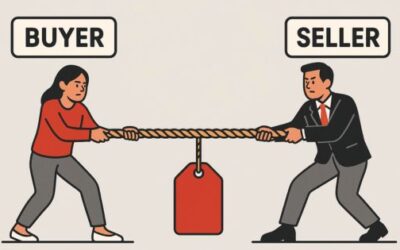The critical link between products and problems
Connecting the dots between a product and its relevance to a specific problem is a critical aspect of Gap Selling. Recently, we found ourselves on the buyer’s side of the table, eagerly anticipating the exploration of an important problem: conversion. Little did we know a lesson in the differences between evidence-based confidence and blind confidence awaited us.
Pitch slapped
The call began, as many do, with what appeared to be a clear agenda. Unsurprisingly, as the founders of Gap Selling, we expect sellers to dig into our problems. When we take a sales call, we expect people know who we are and are ready to immerse ourselves into a discovery process. This meeting, however, took an immediate turn. After intros we were plunged straight into a product demo.
We quickly moved to realign the discussion to our expectations, announcing our need to understand the current state of our conversion processes. We wanted to explore customer behaviors, define our ICP, find blind spots, and articulate our desired destination. We wanted to learn from conversion experts. We assumed we would lay the ground work upfront for a meaningful discussion on a potential product-problem fit. They insisted on demoing.
Seller’s agenda vs. buyer’s expectations
Frustrations mounted as it became clear the seller’s agenda did not align with ours. Our concerns about their understanding of our situation were dismissed, despite repeated attempts to refocus on the current state. They pushed forward with the demo.
I don’t care about your product
We’d had enough. “I don’t care about seeing your product. You need to understand OUR conversion issues.” That was it, our last ditch effort to realign, only for the seller to stay true to their demo plan. This cycle left our team confused, lost, and ultimately unheard and irritated.
I’m confident we can help
The seller insisted they knew how to help us and confidently said “I’m confident we can help you.” They showed us customer success stories and metrics, hoping to twist our arms into submission. Our primary concern, one that we had repeated from the jump, was that their product was a brilliant solution for a transactional purchase problem. Our primary business is not a transactional purchase. We were left to struggle to connect the dots for ourselves; how can a transactional conversion tool help a team with an actual sales cycle?
Finally, we just asked: “Have you seen success with non-transactional conversion with your tool?” Without skipping a beat the seller responded “no, but I’m confident it’ll work.”
Seller’s blind confidence
Blind confidence will kill you as a seller. A belief in the universal applicability, regardless of specific nuances of the buyer’s business, will erode the buying confidence instantly. This seller’s landmark success story was a company that sold pants. What evidence supports the confidence in this product, in this scenario?
There wasn’t any, or if there was, it wasn’t presented to us. By this point it was obvious the seller’s goal was to let the free trial speak for itself. They insisted we had nothing to lose and everything to gain. It wouldn’t cost us anything. Which, is never true. Implementation, always costs money. Implementation, requires developers to make changes to the code, it requires our team to reallocate time from other projects to get their “free trial” up and running.
Your product’s true value
This interaction highlighted 2 giant issues in sales. 1. Blind confidence is an incredibly dangerous trait of a seller and 2. a product’s value lies in it’s ability to address a specific problem. This seller had no shortage of confidence in their product, but they failed to recognize the importance of problem-relevance. In the eyes of the buyer, a product is only as good as its ability to solve the problem. Without this connection the product, no matter how good, is useless.
Your confidence should come from your understanding of the buyer’s world
Confidence, must be tied to the buyer’s world and their problem. I don’t care about your success selling pants. I have no confidence selling pants translates to selling corporate level sales training. Confidence should come from your ability to comprehend and address the buyer’s challenges. Your confidence does not translate directly to the buyer. Until you understand my world, demonstrate this understanding to me, show me how your product addresses the issues in my world, I won’t have confidence in your product.
Stop selling, start helping
The longer I sit in this seat, the more obvious it becomes where the sales cycle is broken. Let me be clear – I am not an expert when it comes to conversions. I’ve got a grasp on the basics, I understand a click through rate and I can outline a sales/marketing funnel, but I don’t understand the intricacies of it.
There was a opportunity here. They missed because they left me in the dark. I lack the insights to understand how your product fixes what’s broken because, truth be told, I don’t even know what’s broken and they didn’t help me understand. Buyers are willing to listen to you if you are able to shine a light on their issues and help them understand what’s wrong. That’s why we say stop selling, start helping.






0 Comments